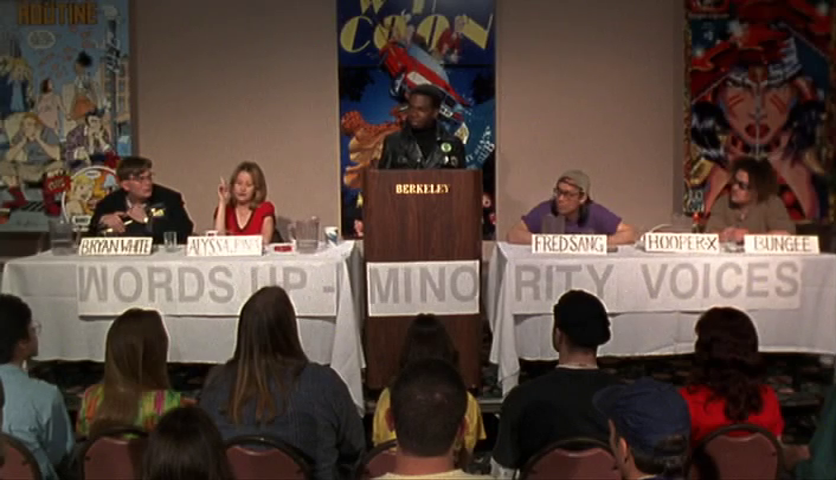Earlier this morning I came across this tweet by Mary Fan, an author I met at the Farpoint convention and whose books I quite enjoy:
I gave a short reply, but I felt Twitter was inadequate to truly express myself. Of course, Diversity Panels have been around long enough that by 1997’s Chasing Amy (source of the header image), they were already making jokes about how some folks were always relegated to the Diversity Panel (click to play):
I also attended the diversity panel at Worldcon last year where the big topic was on the diversity of protagonists. Mary Fan’s tweet made me think about the utility vs the negative (if there is a negative) of having diversity panels as well as a bit of a meditation on the fact that they’re still extant. Let’s take these one by one.
So, what’s the utility of the diversity panel? The biggest utility I see is when other writers from various marginalized groups are in attendance. It’s been shown that seeing others that share your identity (whatever that means to you) doing whatever it is you would like to do shows you that it’s possible. Until recently if you’re an Asian actor you might think your only Hollywood roles are kung fu master or exotic babe. Then we get Crazy Rich Asians and it paves the way for Always Be My Maybe and suddenly both Hollywood and would-be actors learn they can have “regular”-person roles instead of being stuck stereotyped. The same goes with authors. Back in the day, many women had to write SFF under pseudonyms, the most famous example being Alice Bradley Sheldon, who wrote as James Tiptree Jr. But as more women have been recognized via awards like the Hugos, more women have joined the fray, seeing they can make it and get awarded. To the point where there was a very sad, very lame backlash.
What are the potential negatives? I’m reminded of my undergrad years at Cornell, 2001-2005. At that time (not sure if it still exists) there was some affinity housing. There was an African-American dorm named Ujamaa and there was a Latinx one, but I can’t remember the name. At any rate, the affinity housing existed as a potential place (especially for Freshmen) to get acclimated to a college that was majority white. (And also at least seemed majority from the North East USA) To those who loved it, this was a literal safe space (not the metaphorical one that has been fought about for the past decade or so) to recover from culture shock and microaggressions (even though we didn’t have that word yet when I was an undergrad). To those who were against it (oftentimes, but not always, members of the Young Convervatives club), it was a harmful segregation, even if it was self-imposed. Like many things, I think the reality lies somewhere in the middle. I think it could definitely be a bad thing for anyone who retreated so much that they did not gain experience with others outside their affinity group. So, bringing it back to diversity panels at cons – there’s a chance that these become ghettos of a sort. Yeah, the same old folks can be on the main stage. But it’s OK because we have [name your identity: women, latinx, African-Americans, wheelchair riders, etc] in the diversity panel. It dovetails with what RF Kuang said when Tor.com made her guest editor – when are we going to move away from Asian SFF and just call it SFF? And the author just happens to be Asian. Sometimes these things can be self-perpetuating.
And finally, there’s the sad fact that this conversation is still taking place in 2022. I mean, it’s somewhat unsurprising. The Japanese Internment (I know others have other words besides ‘internment’ to use here) was just 80ish years ago. But it wasn’t until 1988 that the US Government apologized, and that’s only 34 years ago. And around the world things seem to be slipping backwards in terms of progress. After this week’s Supreme Court leak, even anti-miscegenation laws seem to be back on the table with a potential overturning of Loving v Virginia coming.
So just maybe we need to keep the panels going for now. To provide hope for other writers who feel marginalized. To show others that success can be had no matter what. And to push, even in this small way, against the back-sliding of the equality we’ve spent so long building up.

